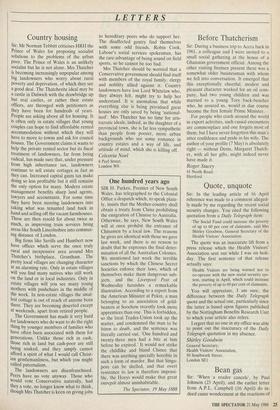LETTERS Country housing
Sir: Mr Norman Tebbitt criticises HRH the Prince of Wales for proposing socialist solutions to the problems of the urban poor. The Prince of Wales is an unlikely socialist but he is not alone. Mrs Thatcher is becoming increasingly unpopular among big landownerg who worry about rural poverty and deprivation, of which they see a good deal. The Thatcherite ideal may be a castle in Dulwich with the drawbridge up but real castles, or rather their estate offices, are thronged with petitioners as they have been for hundreds of years. People are asking above all for housing. It is often only in estate villages that young couples can hope to find affordable rented accommodation without which they will have to move to towns and ask for council houses. The Government claims it wants to help the private rented sector but its fiscal treatment of landowners, far from being radical, has made sure that, under pressure from high inheritance tax, landowners continue to sell estate cottages as fast as they can. Increased capital gains tax make doing so less profitable but it still remains the only option for many. Modern estate management benefits sharp land agents, lawyers and accountants. For some time they have been steering landowners into taking what was tenanted land back in hand and selling off the vacant farmhouses. These are then resold for about twice as much, as improving train services bring areas like South Lincolnshire into commut- ing distance of London.
Big firms like Savills and Humbert now have offices which serve the once truly rural and inexpensive area around Mrs Thatcher's birthplace, Grantham. The pretty local villages are changing character at an alarming rate. Only in estate villages will you find many natives who still work on the land or in local industries. Only in estate villages will you see many young mothers with pushchairs in the middle of the week. In non-estate villages the smal- lest cottage is out of reach of anyone born there. They are becoming deserted except at weekends, apart from retired people.
The Government has made it very hard for landowners who do want to do the right thing by younger members of families who have often been associated with them for generations. Unlike those rich in cash, those rich in land but cash-poor are still being soaked, and they simply cannot afford a spirit of what I would call Christ- ian gentlemanliness, but which you might called paternalism.
The landowners are disenfranchised. Peers have no vote anyway. Those who would vote Conservative naturally, had they a vote, no longer know what to think, though Mrs Thatcher is keen on giving jobs to hereditary peers who do support her. The disaffected gentry find themselves with some odd friends. Robin Cook, Labour's social services spokesman, has the rare advantage of being sound on field sports, so he cannot be too bad.
Mrs Thatcher should be worried that a Conservative government should find itself with members of the royal family, clergy and nobility allied against it. Country landowners have lost Lord Whitelaw who, they always felt, might try to help her understand. It is anomalous that while everything else is being privatised great houses are only saved by being 'national- ised'. Mrs Thatcher has no time for aris- tocratic ideals, indeed, as the daughter of a provincial town, she is far less sympathetic than people from poorer, more urban backgrounds who see some romance in country estates and a way of life, and attitude of mind, which she is killing off. Celestria Noel
8 Peel Street, London W8






























































 Previous page
Previous page